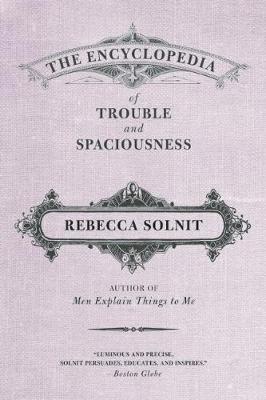
Stock image for illustration purposes only - book cover, edition or condition may vary.
The Encyclopedia of Trouble and Spaciousness
Rebecca Solnit
€ 19.91
FREE Delivery in Ireland
Description for The Encyclopedia of Trouble and Spaciousness
Paperback. .
The incomparable Rebecca Solnit, author of more than a dozen acclaimed, prizewinning books of nonfiction including Men Explain Things To Me, brings the same dazzling writing to the essays in The Encyclopedia of Trouble and Spaciousness; hailed by the Los Angeles Times as globally wide-ranging and topically urgent and the Boston Globe as luminous and precise. . As the title suggests, the territory of Solnit's concerns is vast, and in her signature alchemical style she combines commentary on history, justice, war and peace, and explorations of place, art, and community, all while writing with the lyricism of ... Read more
The incomparable Rebecca Solnit, author of more than a dozen acclaimed, prizewinning books of nonfiction including Men Explain Things To Me, brings the same dazzling writing to the essays in The Encyclopedia of Trouble and Spaciousness; hailed by the Los Angeles Times as globally wide-ranging and topically urgent and the Boston Globe as luminous and precise. . As the title suggests, the territory of Solnit's concerns is vast, and in her signature alchemical style she combines commentary on history, justice, war and peace, and explorations of place, art, and community, all while writing with the lyricism of ... Read more
Product Details
Publisher
Trinity University Press,U.S. United States
Number of pages
344
Format
Paperback
Publication date
2015
Condition
New
Number of Pages
344
Place of Publication
San Antonio, United States
ISBN
9781595347534
SKU
V9781595347534
Shipping Time
Usually ships in 15 to 20 working days
Ref
99-15
About Rebecca Solnit
San Francisco writer Rebecca Solnit is the author of fifteen books about art, landscape, public and collective life, ecology, politics, hope, meandering, reverie, and memory. They include Men Explain Things To Me, The Faraway Nearby; Infinite City: A San Francisco Atlas; A Paradise Built in Hell: The Extraordinary Communities That Arise in Disaster; Storming the Gates of Paradise; A Field ... Read more
Reviews for The Encyclopedia of Trouble and Spaciousness
What to call a journalist who writes about place while avoiding the subjects of luxury hotels, remote restaurants and urbane oddities? Not a travel writer, surely. And not an adventurer. One could do worse than answer with 'Rebecca Solnit'.
The New York Times Book Review Solnit's signature blend of history, science, justice, and the personal illustrates each location ... Read more
The New York Times Book Review Solnit's signature blend of history, science, justice, and the personal illustrates each location ... Read more
